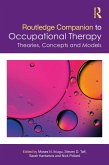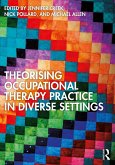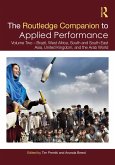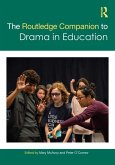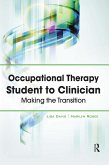Routledge Companion to Occupational Therapy (eBook, ePUB)
Theories, Concepts and Models
Redaktion: Ikiugu, Moses N.; Pollard, Nick; Kantartzis, Sarah; Taff, Steven D.
46,95 €
46,95 €
inkl. MwSt.
Erscheint vor. 31.03.25

23 °P sammeln
46,95 €
Als Download kaufen

46,95 €
inkl. MwSt.
Erscheint vor. 31.03.25

23 °P sammeln
Jetzt verschenken
Alle Infos zum eBook verschenken
46,95 €
inkl. MwSt.
Erscheint vor. 31.03.25
Alle Infos zum eBook verschenken

23 °P sammeln
Unser Service für Vorbesteller - Ihr Vorteil ohne Risiko:
Sollten wir den Preis dieses Artikels vor dem Erscheinungsdatum senken, werden wir Ihnen den Artikel bei der Auslieferung automatisch zum günstigeren Preis berechnen.
Sollten wir den Preis dieses Artikels vor dem Erscheinungsdatum senken, werden wir Ihnen den Artikel bei der Auslieferung automatisch zum günstigeren Preis berechnen.
Routledge Companion to Occupational Therapy (eBook, ePUB)
Theories, Concepts and Models
Redaktion: Ikiugu, Moses N.; Pollard, Nick; Kantartzis, Sarah; Taff, Steven D.
- Format: ePub
- Merkliste
- Auf die Merkliste
- Bewerten Bewerten
- Teilen
- Produkt teilen
- Produkterinnerung
- Produkterinnerung

Bitte loggen Sie sich zunächst in Ihr Kundenkonto ein oder registrieren Sie sich bei
bücher.de, um das eBook-Abo tolino select nutzen zu können.
Hier können Sie sich einloggen
Hier können Sie sich einloggen
Sie sind bereits eingeloggt. Klicken Sie auf 2. tolino select Abo, um fortzufahren.

Bitte loggen Sie sich zunächst in Ihr Kundenkonto ein oder registrieren Sie sich bei bücher.de, um das eBook-Abo tolino select nutzen zu können.
This comprehensive and groundbreaking text provides an indispensable guide to key theories, models, and concepts informing occupational therapy's professional practice. It includes contributions from a range of international scholars and addresses practice with individuals, groups, and communities.
- Geräte: eReader
- mit Kopierschutz
- eBook Hilfe
- Größe: 13.87MB
Andere Kunden interessierten sich auch für
![Routledge Companion to Occupational Therapy (eBook, PDF) Routledge Companion to Occupational Therapy (eBook, PDF)]() Routledge Companion to Occupational Therapy (eBook, PDF)46,95 €
Routledge Companion to Occupational Therapy (eBook, PDF)46,95 €![Theorising Occupational Therapy Practice in Diverse Settings (eBook, ePUB) Theorising Occupational Therapy Practice in Diverse Settings (eBook, ePUB)]() Theorising Occupational Therapy Practice in Diverse Settings (eBook, ePUB)34,95 €
Theorising Occupational Therapy Practice in Diverse Settings (eBook, ePUB)34,95 €![The Routledge Companion to Applied Performance (eBook, ePUB) The Routledge Companion to Applied Performance (eBook, ePUB)]() The Routledge Companion to Applied Performance (eBook, ePUB)45,95 €
The Routledge Companion to Applied Performance (eBook, ePUB)45,95 €![The Routledge Companion to Applied Performance (eBook, ePUB) The Routledge Companion to Applied Performance (eBook, ePUB)]() The Routledge Companion to Applied Performance (eBook, ePUB)45,95 €
The Routledge Companion to Applied Performance (eBook, ePUB)45,95 €![The Routledge Companion to Drama in Education (eBook, ePUB) The Routledge Companion to Drama in Education (eBook, ePUB)]() The Routledge Companion to Drama in Education (eBook, ePUB)46,95 €
The Routledge Companion to Drama in Education (eBook, ePUB)46,95 €![Occupational Therapy Student to Clinician (eBook, ePUB) Occupational Therapy Student to Clinician (eBook, ePUB)]() Lisa DavisOccupational Therapy Student to Clinician (eBook, ePUB)59,95 €
Lisa DavisOccupational Therapy Student to Clinician (eBook, ePUB)59,95 €![Routledge International Handbook of Positive Health Sciences (eBook, ePUB) Routledge International Handbook of Positive Health Sciences (eBook, ePUB)]() Routledge International Handbook of Positive Health Sciences (eBook, ePUB)46,95 €
Routledge International Handbook of Positive Health Sciences (eBook, ePUB)46,95 €-
-
-
This comprehensive and groundbreaking text provides an indispensable guide to key theories, models, and concepts informing occupational therapy's professional practice. It includes contributions from a range of international scholars and addresses practice with individuals, groups, and communities.
Dieser Download kann aus rechtlichen Gründen nur mit Rechnungsadresse in A, B, BG, CY, CZ, D, DK, EW, E, FIN, F, GR, HR, H, IRL, I, LT, L, LR, M, NL, PL, P, R, S, SLO, SK ausgeliefert werden.
Produktdetails
- Produktdetails
- Verlag: Taylor & Francis eBooks
- Erscheinungstermin: 31. März 2025
- Englisch
- ISBN-13: 9781040308684
- Artikelnr.: 73367408
- Verlag: Taylor & Francis eBooks
- Erscheinungstermin: 31. März 2025
- Englisch
- ISBN-13: 9781040308684
- Artikelnr.: 73367408
- Herstellerkennzeichnung Die Herstellerinformationen sind derzeit nicht verfügbar.
Moses N. Ikiugu, Professor and Director of Research, Occupational Therapy, University of South Dakota, USA. Steven D. Taff, Professor, Program in Occupational Therapy and Department of Medicine, Washington University School of Medicine in St. Louis, USA. Sarah Kantartzis, Honorary Professor, Division of Occupational Therapy and Arts Therapies, Queen Margaret University, Edinburgh, UK. Nick Pollard, Senior Lecturer in Occupational Therapy, Sheffield Hallam University, UK.
Foreword by Charles Christiansen. Introduction. 1.Contextualizing Theory
Use and Development in Occupational Therapy. 2.Differences among Theories,
Models, and Frames of Reference: Professional Discourse. Section I: Theory
Application. 3.Eclectic Framework for Person-Centered, Evidence-Based,
Theory-Driven, and Occupation-Based Practice. Appendix 3.A: Template for
Mapping Theoretical Constructs/Propositions to Clinical Case. 4.Use of
Occupations as Media in Occupational Therapy Interventions . Appendix 4.A:
The MPRORS Assessment for Skyler. 5.Occupation and Social Transformation
with Communities and Populations. 6.Life Course Theory and Occupation.
Section II: Conceptual and Practice Models/Theories for Intervention.
7.The Occupational Performance Model (Australia): Constructs, structure,
propositions, and utility for occupational therapy practice.
8.Behavioral/Cognitive-Behavioral Approaches to Occupational Engagement.
Appendix 8.A: Occupation-Based Cognitive Self-Assessment. Appendix 8.B:
Adaptive Habit Assessment. Appendix 8.C: Occupation-Based Cognitive
Restructuring Intervention. Appendix 8.D: Habit Formation Worksheet. 9.The
Biel Model. 10.Canadian Model of Occupational Performance and Engagement.
11.The Capabilities, Opportunities, Resources, and Environments (CORE)
Approach for Inclusive and Occupation-Centred Practice. 12.The Cognitive
Orientation to Daily Occupational Performance (CO-OP): Theoretical
Perspectives. 13.The Ecology of Human Performance. 14.Instrumentalism in
Occupational Therapy Theoretical Conceptual Model of Practice. 15.Lifestyle
Redesign®: An Intervention Framework for Preventing and Managing Chronic
Conditions. 16.The Kawa (River) Model: Occupation, Diversity, Justice and
Belonging Flowing. 17.Model of Human Occupation. 18.Motor Control Theory.
19.The Multicontext Approach for Cognitive Rehabilitation. 20.The
Occupation-based Community Development (ObCD) Framework. 21.Occupational
Therapy Intervention Process Model. 22.The Participatory Occupational
Justice Framework (POJF) and Illustration of Its Use.
23.Person-Environment-Occupation-Performance (PEOP) Model. 24.Psychodynamic
Theory. 25.Self-management and Self-efficacy in Supporting Occupational
Engagement. 26.Sensory Integration Theory. 27.The Spirito-cultural Human
Occupation (SpiCHO) Complex: A Theoretical Framework Based on a Ghanaian
Perspective. 28.The Theory of Occupational Adaptation. 29.Introduction to
the Value and Meaningful Occupations Model. 30.The Vona du Toit Model of
Creative Ability. . 31.Bronfenbrenner's Bioecological Model of Human
Development. 32.The Capabilities Approach. 33.Cultural humility: Shining a
light on our blind spots to reduce harm in clinical, educational, and
research settings. 34.Critical and Situated Advocacy in Occupational
Therapy. 35.Family-Centered Approaches. 36.The Human Activity Assistive
Technology (HAAT) Model. 37.Intersectionality Theory. 38.Lawton & Nahemow's
Environmental Press-Competence Model. 39.Occupation and Health Promotion.
40.Re-viewing the Social Context of Occupation Through a Theoretical Lens:
Social Capital. Social Identity and Social Support - Bourdieu, Holland, and
Putnam. 41.Social Determinants of Health, Health Equity, and Health
Disparities. 42.Theory-Based Groups in Occupational Therapy. 43.Therapeutic
Use of Self in Occupational Therapy Relationships. 44.Trauma Informed Care
Trust Based Relational Intervention®. 45. Section IV: Theories of Education
and Learning in Occupational Therapy. 46.Critical Pedagogy: Praxis and
Social Reform through Education. 47.Sociocultural Learning Theories.
48.Situated Learning. 49.Adult Learning Theory. 50.Growth Mindset:
Facilitating Resilience and Self-Efficacy in Learners. 51.Experiential
Learning Theory. 52.Schön's Theory of Reflective Practice.
53.Transformational Learning Theory. Section V: Developing and Validating
Theories through Research. 54.Theory Building as Research. 55.Testing and
Refining Occupational Therapy Theory. 56.Applying Theory and Research
Evidence in Occupational Therapy. 57.The Future of Theory in Occupational
Therapy.
Use and Development in Occupational Therapy. 2.Differences among Theories,
Models, and Frames of Reference: Professional Discourse. Section I: Theory
Application. 3.Eclectic Framework for Person-Centered, Evidence-Based,
Theory-Driven, and Occupation-Based Practice. Appendix 3.A: Template for
Mapping Theoretical Constructs/Propositions to Clinical Case. 4.Use of
Occupations as Media in Occupational Therapy Interventions . Appendix 4.A:
The MPRORS Assessment for Skyler. 5.Occupation and Social Transformation
with Communities and Populations. 6.Life Course Theory and Occupation.
Section II: Conceptual and Practice Models/Theories for Intervention.
7.The Occupational Performance Model (Australia): Constructs, structure,
propositions, and utility for occupational therapy practice.
8.Behavioral/Cognitive-Behavioral Approaches to Occupational Engagement.
Appendix 8.A: Occupation-Based Cognitive Self-Assessment. Appendix 8.B:
Adaptive Habit Assessment. Appendix 8.C: Occupation-Based Cognitive
Restructuring Intervention. Appendix 8.D: Habit Formation Worksheet. 9.The
Biel Model. 10.Canadian Model of Occupational Performance and Engagement.
11.The Capabilities, Opportunities, Resources, and Environments (CORE)
Approach for Inclusive and Occupation-Centred Practice. 12.The Cognitive
Orientation to Daily Occupational Performance (CO-OP): Theoretical
Perspectives. 13.The Ecology of Human Performance. 14.Instrumentalism in
Occupational Therapy Theoretical Conceptual Model of Practice. 15.Lifestyle
Redesign®: An Intervention Framework for Preventing and Managing Chronic
Conditions. 16.The Kawa (River) Model: Occupation, Diversity, Justice and
Belonging Flowing. 17.Model of Human Occupation. 18.Motor Control Theory.
19.The Multicontext Approach for Cognitive Rehabilitation. 20.The
Occupation-based Community Development (ObCD) Framework. 21.Occupational
Therapy Intervention Process Model. 22.The Participatory Occupational
Justice Framework (POJF) and Illustration of Its Use.
23.Person-Environment-Occupation-Performance (PEOP) Model. 24.Psychodynamic
Theory. 25.Self-management and Self-efficacy in Supporting Occupational
Engagement. 26.Sensory Integration Theory. 27.The Spirito-cultural Human
Occupation (SpiCHO) Complex: A Theoretical Framework Based on a Ghanaian
Perspective. 28.The Theory of Occupational Adaptation. 29.Introduction to
the Value and Meaningful Occupations Model. 30.The Vona du Toit Model of
Creative Ability. . 31.Bronfenbrenner's Bioecological Model of Human
Development. 32.The Capabilities Approach. 33.Cultural humility: Shining a
light on our blind spots to reduce harm in clinical, educational, and
research settings. 34.Critical and Situated Advocacy in Occupational
Therapy. 35.Family-Centered Approaches. 36.The Human Activity Assistive
Technology (HAAT) Model. 37.Intersectionality Theory. 38.Lawton & Nahemow's
Environmental Press-Competence Model. 39.Occupation and Health Promotion.
40.Re-viewing the Social Context of Occupation Through a Theoretical Lens:
Social Capital. Social Identity and Social Support - Bourdieu, Holland, and
Putnam. 41.Social Determinants of Health, Health Equity, and Health
Disparities. 42.Theory-Based Groups in Occupational Therapy. 43.Therapeutic
Use of Self in Occupational Therapy Relationships. 44.Trauma Informed Care
Trust Based Relational Intervention®. 45. Section IV: Theories of Education
and Learning in Occupational Therapy. 46.Critical Pedagogy: Praxis and
Social Reform through Education. 47.Sociocultural Learning Theories.
48.Situated Learning. 49.Adult Learning Theory. 50.Growth Mindset:
Facilitating Resilience and Self-Efficacy in Learners. 51.Experiential
Learning Theory. 52.Schön's Theory of Reflective Practice.
53.Transformational Learning Theory. Section V: Developing and Validating
Theories through Research. 54.Theory Building as Research. 55.Testing and
Refining Occupational Therapy Theory. 56.Applying Theory and Research
Evidence in Occupational Therapy. 57.The Future of Theory in Occupational
Therapy.
Foreword by Charles Christiansen. Introduction. 1.Contextualizing Theory
Use and Development in Occupational Therapy. 2.Differences among Theories,
Models, and Frames of Reference: Professional Discourse. Section I: Theory
Application. 3.Eclectic Framework for Person-Centered, Evidence-Based,
Theory-Driven, and Occupation-Based Practice. Appendix 3.A: Template for
Mapping Theoretical Constructs/Propositions to Clinical Case. 4.Use of
Occupations as Media in Occupational Therapy Interventions . Appendix 4.A:
The MPRORS Assessment for Skyler. 5.Occupation and Social Transformation
with Communities and Populations. 6.Life Course Theory and Occupation.
Section II: Conceptual and Practice Models/Theories for Intervention.
7.The Occupational Performance Model (Australia): Constructs, structure,
propositions, and utility for occupational therapy practice.
8.Behavioral/Cognitive-Behavioral Approaches to Occupational Engagement.
Appendix 8.A: Occupation-Based Cognitive Self-Assessment. Appendix 8.B:
Adaptive Habit Assessment. Appendix 8.C: Occupation-Based Cognitive
Restructuring Intervention. Appendix 8.D: Habit Formation Worksheet. 9.The
Biel Model. 10.Canadian Model of Occupational Performance and Engagement.
11.The Capabilities, Opportunities, Resources, and Environments (CORE)
Approach for Inclusive and Occupation-Centred Practice. 12.The Cognitive
Orientation to Daily Occupational Performance (CO-OP): Theoretical
Perspectives. 13.The Ecology of Human Performance. 14.Instrumentalism in
Occupational Therapy Theoretical Conceptual Model of Practice. 15.Lifestyle
Redesign®: An Intervention Framework for Preventing and Managing Chronic
Conditions. 16.The Kawa (River) Model: Occupation, Diversity, Justice and
Belonging Flowing. 17.Model of Human Occupation. 18.Motor Control Theory.
19.The Multicontext Approach for Cognitive Rehabilitation. 20.The
Occupation-based Community Development (ObCD) Framework. 21.Occupational
Therapy Intervention Process Model. 22.The Participatory Occupational
Justice Framework (POJF) and Illustration of Its Use.
23.Person-Environment-Occupation-Performance (PEOP) Model. 24.Psychodynamic
Theory. 25.Self-management and Self-efficacy in Supporting Occupational
Engagement. 26.Sensory Integration Theory. 27.The Spirito-cultural Human
Occupation (SpiCHO) Complex: A Theoretical Framework Based on a Ghanaian
Perspective. 28.The Theory of Occupational Adaptation. 29.Introduction to
the Value and Meaningful Occupations Model. 30.The Vona du Toit Model of
Creative Ability. . 31.Bronfenbrenner's Bioecological Model of Human
Development. 32.The Capabilities Approach. 33.Cultural humility: Shining a
light on our blind spots to reduce harm in clinical, educational, and
research settings. 34.Critical and Situated Advocacy in Occupational
Therapy. 35.Family-Centered Approaches. 36.The Human Activity Assistive
Technology (HAAT) Model. 37.Intersectionality Theory. 38.Lawton & Nahemow's
Environmental Press-Competence Model. 39.Occupation and Health Promotion.
40.Re-viewing the Social Context of Occupation Through a Theoretical Lens:
Social Capital. Social Identity and Social Support - Bourdieu, Holland, and
Putnam. 41.Social Determinants of Health, Health Equity, and Health
Disparities. 42.Theory-Based Groups in Occupational Therapy. 43.Therapeutic
Use of Self in Occupational Therapy Relationships. 44.Trauma Informed Care
Trust Based Relational Intervention®. 45. Section IV: Theories of Education
and Learning in Occupational Therapy. 46.Critical Pedagogy: Praxis and
Social Reform through Education. 47.Sociocultural Learning Theories.
48.Situated Learning. 49.Adult Learning Theory. 50.Growth Mindset:
Facilitating Resilience and Self-Efficacy in Learners. 51.Experiential
Learning Theory. 52.Schön's Theory of Reflective Practice.
53.Transformational Learning Theory. Section V: Developing and Validating
Theories through Research. 54.Theory Building as Research. 55.Testing and
Refining Occupational Therapy Theory. 56.Applying Theory and Research
Evidence in Occupational Therapy. 57.The Future of Theory in Occupational
Therapy.
Use and Development in Occupational Therapy. 2.Differences among Theories,
Models, and Frames of Reference: Professional Discourse. Section I: Theory
Application. 3.Eclectic Framework for Person-Centered, Evidence-Based,
Theory-Driven, and Occupation-Based Practice. Appendix 3.A: Template for
Mapping Theoretical Constructs/Propositions to Clinical Case. 4.Use of
Occupations as Media in Occupational Therapy Interventions . Appendix 4.A:
The MPRORS Assessment for Skyler. 5.Occupation and Social Transformation
with Communities and Populations. 6.Life Course Theory and Occupation.
Section II: Conceptual and Practice Models/Theories for Intervention.
7.The Occupational Performance Model (Australia): Constructs, structure,
propositions, and utility for occupational therapy practice.
8.Behavioral/Cognitive-Behavioral Approaches to Occupational Engagement.
Appendix 8.A: Occupation-Based Cognitive Self-Assessment. Appendix 8.B:
Adaptive Habit Assessment. Appendix 8.C: Occupation-Based Cognitive
Restructuring Intervention. Appendix 8.D: Habit Formation Worksheet. 9.The
Biel Model. 10.Canadian Model of Occupational Performance and Engagement.
11.The Capabilities, Opportunities, Resources, and Environments (CORE)
Approach for Inclusive and Occupation-Centred Practice. 12.The Cognitive
Orientation to Daily Occupational Performance (CO-OP): Theoretical
Perspectives. 13.The Ecology of Human Performance. 14.Instrumentalism in
Occupational Therapy Theoretical Conceptual Model of Practice. 15.Lifestyle
Redesign®: An Intervention Framework for Preventing and Managing Chronic
Conditions. 16.The Kawa (River) Model: Occupation, Diversity, Justice and
Belonging Flowing. 17.Model of Human Occupation. 18.Motor Control Theory.
19.The Multicontext Approach for Cognitive Rehabilitation. 20.The
Occupation-based Community Development (ObCD) Framework. 21.Occupational
Therapy Intervention Process Model. 22.The Participatory Occupational
Justice Framework (POJF) and Illustration of Its Use.
23.Person-Environment-Occupation-Performance (PEOP) Model. 24.Psychodynamic
Theory. 25.Self-management and Self-efficacy in Supporting Occupational
Engagement. 26.Sensory Integration Theory. 27.The Spirito-cultural Human
Occupation (SpiCHO) Complex: A Theoretical Framework Based on a Ghanaian
Perspective. 28.The Theory of Occupational Adaptation. 29.Introduction to
the Value and Meaningful Occupations Model. 30.The Vona du Toit Model of
Creative Ability. . 31.Bronfenbrenner's Bioecological Model of Human
Development. 32.The Capabilities Approach. 33.Cultural humility: Shining a
light on our blind spots to reduce harm in clinical, educational, and
research settings. 34.Critical and Situated Advocacy in Occupational
Therapy. 35.Family-Centered Approaches. 36.The Human Activity Assistive
Technology (HAAT) Model. 37.Intersectionality Theory. 38.Lawton & Nahemow's
Environmental Press-Competence Model. 39.Occupation and Health Promotion.
40.Re-viewing the Social Context of Occupation Through a Theoretical Lens:
Social Capital. Social Identity and Social Support - Bourdieu, Holland, and
Putnam. 41.Social Determinants of Health, Health Equity, and Health
Disparities. 42.Theory-Based Groups in Occupational Therapy. 43.Therapeutic
Use of Self in Occupational Therapy Relationships. 44.Trauma Informed Care
Trust Based Relational Intervention®. 45. Section IV: Theories of Education
and Learning in Occupational Therapy. 46.Critical Pedagogy: Praxis and
Social Reform through Education. 47.Sociocultural Learning Theories.
48.Situated Learning. 49.Adult Learning Theory. 50.Growth Mindset:
Facilitating Resilience and Self-Efficacy in Learners. 51.Experiential
Learning Theory. 52.Schön's Theory of Reflective Practice.
53.Transformational Learning Theory. Section V: Developing and Validating
Theories through Research. 54.Theory Building as Research. 55.Testing and
Refining Occupational Therapy Theory. 56.Applying Theory and Research
Evidence in Occupational Therapy. 57.The Future of Theory in Occupational
Therapy.

